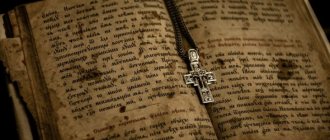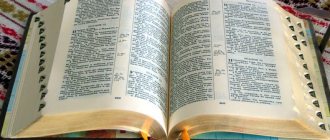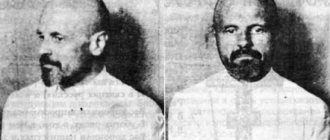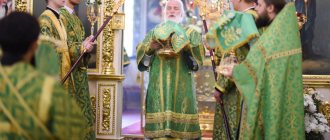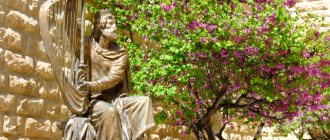Authorship and writing history
The author of sacred verse 69 is the biblical King David, who is known in the Old Testament for his glorification of the Almighty and a large number of good deeds for the Jews.
He often had family problems, like all ordinary people. Historians say that his eldest son Absalom brutally killed his half-brother because he raped his sister Tamar. After committing the crime, the son left the palace and hid from the king for two whole years. He asked people in every possible way to reconcile him with his father and draw David’s attention to his personality.
The holy king generously forgave his son, but he turned out to be ungrateful and started a war against his own father. As a result, David was forced to leave the palace in Jerusalem, taking his loyal subjects with him on the journey. While the king was wandering and hiding from his own son, the text of Psalm 69 was written. Everything in the verse is permeated with a prayer to the Lord to clarify issues, and a desire to receive help in a difficult situation.
The author of sacred verse 69 is the biblical King David
David and Absalom
Work as a courier at Yandex.Eda (up to 3,400 rubles per shift) leave a request →
According to the book of Kings, the king’s son was very handsome and his contemporaries admired him. He had a family, children - everything for a pious, quiet life. But arrogance settled in his soul. A conflict broke out between Absalom and his brother Amnon. David forbade the instigator of the quarrel to see himself for two years. He experienced this state of affairs very painfully.
Trying in every possible way to attract the attention of the king, the disgraced son commits many wrong actions. He threatens his neighbor, burns his fields. Just because Joab refused to serve as a mediator between him and his father. The rebellious goes even further - he organizes an armed rebellion. It was during this period that David wrote many psalms, including 69.
- Psalm 37 - text;
- Interpretation of Psalm 36.
- Why do they read Psalm 108?
Interpretation of Psalm 69
This verse is a sincere prayer addressed to the Almighty to provide help and defeat enemies. Therefore, this psalm is used in all services of Orthodox churches.
In order to correctly understand the meaning of this sacred text, it is necessary to disassemble it element by element.
The very first verse of this psalm is considered controversial. Many analysts are having tough discussions on this matter. There are different versions, but the main one is that King David created this text after the end of the war with Absalom. The author designed the prayer block as a separate song. This was done so that people would more often remember the grave sin that led to tragedy in the family and pray to God for forgiveness.
In the second and third verses, David uses two names of the Most High - God and Lord, this means two hypostases of the Creator. The author here tries to point out to God his enemies who want him dead, asking him to protect him from them.
In the fourth and fifth verses, the holy king thanks the Creator for his help in a difficult situation.
Psalms
All psalms and prayer petitions, and there are over 80 of them, are collected in one sacred book - the Psalter. The creator of most of them is the ruler David. He is not only a biblical hero, but a completely real historical character. What modern Jerusalem is now is the reward of King David. In ancient times, he captured a tiny fortress located at the base of Mount Zion and from it then the capital of Israel. Now this city is considered a city of 3 religions. After Jerusalem was declared the capital, it went down in history as a holy city possessing spiritual power, which is recognized by all tourists.
Ruler David, as is clear, is not the only creator of the psalms included in the Psalter. But specifically, he introduced this typical singing and reading of psalms. All the following church works are based on the style of King David.
Reading the biography of King David, almost everything may seem strange to a modern person. For example, cases when he not only saves the lives of his own opponents and pursuers, but then also mourns their death.
But David also cannot be called one hundred percent blameless. The main example of this is the version with the warrior Uriah and his wife. The ruler took his wife from Uriah, while he sent the warriors to certain death. Such a vile act was reflected in the Bible, where the full depth of his fall is described.
Despair came to David even later, when the prophet Nathan pointed out this situation to him. Hearing such words, David did not become furious; he was afraid of his own actions and repented. Moreover, his repentance was so comprehensive that it helped him rise from the abyss of his own fall. Hence, people reading the psalms must realize: in order to earn the forgiveness and help of the Lord, repentance must be as great as the sin committed.
But not all psalms are repentance. Among them there are those who are imbued with joy and jubilation. The reader seems to receive the positive emotions that the creator himself experienced at the time of their writing.
How and when to read
This sacred verse is part of the ninth kathisma. It is usually read at the evening service, which takes place in monasteries after dinner.
The Psalter may include the text of a prayer in Russian. It is also translated into other languages in various autocephalous churches, where it is listed as psalm 69.
In addition to Compline, this verse can be read when you study the Holy Scriptures or in difficult times you long to receive an answer from the Creator. You need to read these sacred words 40 times.
Typical reading situations:
- it is necessary to receive protection from the forces of evil;
- when sinful passions boil in the soul;
- when problems arise in communicating with relatives;
- when you need to escape from problems and difficulties.
Psalm 69 is part of Kathisma 9
Psalms are read at evening services
The prayer is read 40 times
When to read Psalm 69
In churches and temples, Psalm 69 is read during Great Compline and the Great Midnight Office on Saturday. In monasteries, the words of the song can be heard during the service after the evening meal. The text should be consulted in difficult times when you need answers from the Lord. Psalm 69 is read in Russian and in houses in front of the images when:
- We need protection from bad thoughts and evil forces;
- Problems in relationships with loved ones;
- Overwhelmed by worries and doubts;
- We need answers from the Lord.
Text of Psalm 69 in Russian
1 To the director of the choir. Psalm of David. In memory.
2 Hasten, O God, to deliver me; hasten, O Lord, to help me.
3 Let those who seek my soul be ashamed and put to shame! May those who wish me harm be turned back and consigned to ridicule!
4 Let those who say [to me]: “Well done!” be turned back for reproaching me. Fine!"
5 Let all who seek You rejoice and be glad in You, and let those who love Your salvation say without ceasing: “Great is God!”
6 But I am poor and needy; God, hurry to me! You are my help and my Savior; God! don't slow down.
This psalm is a real salvation for the soul when passions run high and it is necessary to receive salvation and peace, to reconcile neighbors. And only the Lord will help with this.
If you find an error, please select a piece of text and press Ctrl+Enter.
What language to read in
Anyone who has at least once listened to the psalms being read in Church Slavonic is delighted with this reading and admits that this particular sound brings some kind of unearthly pleasure.
And this even despite the fact that the meaning is not fully understood. There is nothing unusual in this: the ear of an inexperienced person with such chants is able to recognize only individual words or phrases. Thus, the general meaning of the sacred text disappears, which begins to emerge only with constant reading practice.
But, with constant readings, a person begins to remember some phrases and even parts of the psalms. This helps to study the Psalter evenly, and at the right moment the necessary experienced words can come to the brain.
Deeply religious people, when reading or practicing psalms, have in front of them exact images of all the heroes. It is believed that the Psalter, translated into Russian, has many inaccuracies that scare off readers. Thus, drawing a conclusion, we can say that the Slavic text is euphonious, but not understandable to many, and the Russian text is clear to everyone, but does not have the desired sound.
Types of Psalms
Systematization of the psalms is necessary for ease of use. There are the following types:
Reading Methods
How to read correctly:
- Reading the day circle. Everyone understands that the psalms are the basis of the daily cycle of worship. At any time of the day you need to read your specific psalms or their excerpts.
- Reading kathismas. The Psalter contains 20 sections, each of which is called a kathisma. Each day has its own week assigned, only these kathismas are read, so in one week the entire psalter is read one hundred percent.
- Study of the psalms one by one. Almost all people thoroughly approach the study of the psalms - they study their history, interpretation, prayers that precede and end them. You can memorize individual passages - this way you can get good topics for your own prayers.
- Experiential knowledge of Scripture is a more effective method of reading. It is no secret that people who do not have a special theological education, but live righteously, are able to interpret the psalms unsurpassed.
But, despite the above, we should not forget: no amount of independent reading at home can replace the actual worship in church. Indeed, in this case, all the psalms and prayers read appear and are felt as part of the entire Christian Church. Any believer will confirm that the mystical atmosphere present at services in churches is incomparable to anything else.


